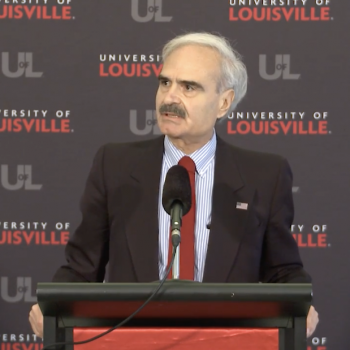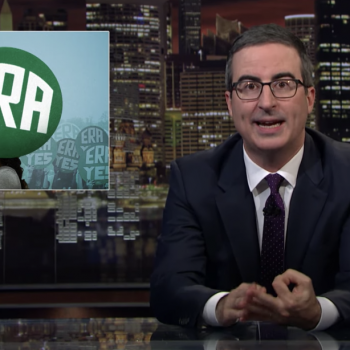Earlier today, the Supreme Court rejected an appeal from a group of atheists trying to get “In God We Trust” off our money. (It’s case 18-1297 in case you’re curious.) This was the most recent case brought forth by atheist activist Michael Newdow, most famous for his unsuccessful battle over “Under God” in the Pledge of Allegiance.

Last August, the Eighth U.S. Circuit Court of Appeals ruled unanimously (3-0) against more than two dozen atheists, their children, and two groups named in the lawsuit. They said the phrase didn’t violate the First Amendment’s Establishment Clause and Free Exercise Clause, the Religious Freedom Restoration Act (RFRA), or the Equal Protection component of the Fifth Amendment.
The judges said that the motto was part of an established tradition in the U.S. going back to our founding and that the phrase wasn’t unfairly coercive. (One judge didn’t concur on some of the analysis, but the end result was the same.)
The Constitution does not prevent the Government from promoting and “celebrat[ing] our tradition of religious freedom,” even if the means of doing so — here, adding the national motto to U.S. money — was motivated “in part because of religious sentiment”… Placing “In God We Trust” on coins and currency is consistent with historical practices.
…
… we recognize that convenience may lead some Plaintiffs to carry cash, but nothing compels them to assert their trust in God. Certainly no “reasonable observer” would think that the Government is attempting to force citizens to express trust in God with every monetary transaction.
Newdow, who has been filing similar lawsuits across the country (hoping that one court of appeals will eventually rule in his favor), was livid at the time:
Michael Newdow, a lawyer for the plaintiffs, in an email called it “utterly revolting” that “the history of governmental denigration of a suspect class should trump [the] principle” that neutrality be the “touchstone” for analyzing claims under the First Amendment’s Establishment Clause.
To be sure, no one was really expecting a different result. But there have been moments of dissent within judicial ranks. In this ruling, one judge did not concur with part of the majority’s ruling, and in May of 2018, a different judge actually sided with the atheists. (Newdow’s Pledge case only went to the Supreme Court after an Appeals Court voted 2-1 in his favor.)
After the judges unanimously ruled against him, and the full Eighth Circuit refused to rehear the case, Newdow threw a Hail Mary pass to the Supreme Court. He argued that this case was the “perfect vehicle to bring clarity” to the Court’s understanding of the Establishment Clause. After all, the national motto is “a clearly exclusionary religious claim” and the Court needs to figure out whether “religion” ought to be synonymous with “Monotheism.”
The other argument Newdow made was that the Court needed to answer the question of whether the Constitution permits the “disregard of devout atheists.” As he saw it, putting an explicitly religious phrase on currency was doing just that.
The legislature’s “goal” in choosing “In God We Trust” to be the nation’s motto was not to honor “religion’s role in American life,” but to honor the role of one specific subset of religion — i.e., Monotheism. This Court can use this case to expose and highlight that key fact so that true religious equality and freedom can thrive under an Establishment Clause jurisprudence that is no longer devoid of the clarity it has been missing for so long.
This case would also be an excellent one to ensure that the claim made by the Eighth Circuit — i.e., that a “historical practices and understandings” analysis is now to be used when Establishment Clause violations are alleged — is correct.
The justices didn’t see it that way. That’s mostly understandable. It’s not like lower courts are divided on this issue — Newdow might say they’re all wrong in the same direction. But the end result is that the Supreme Court didn’t feel the need to step in to resolve anything. Your need four judges to agree to take up a case. Those votes weren’t there on this case. The case was dismissed without comment.
By my count, there are only three circuits left that haven’t ruled on this issue. You can bet Newdow will keep going until he’s exhausted all his options.
(Image via Shutterstock. Portions of this article were published earlier)



It’s Moving Day for the Friendly ..."
It’s Moving Day for the Friendly ..."
It’s Moving Day for the Friendly ..."
It’s Moving Day for the Friendly ..."